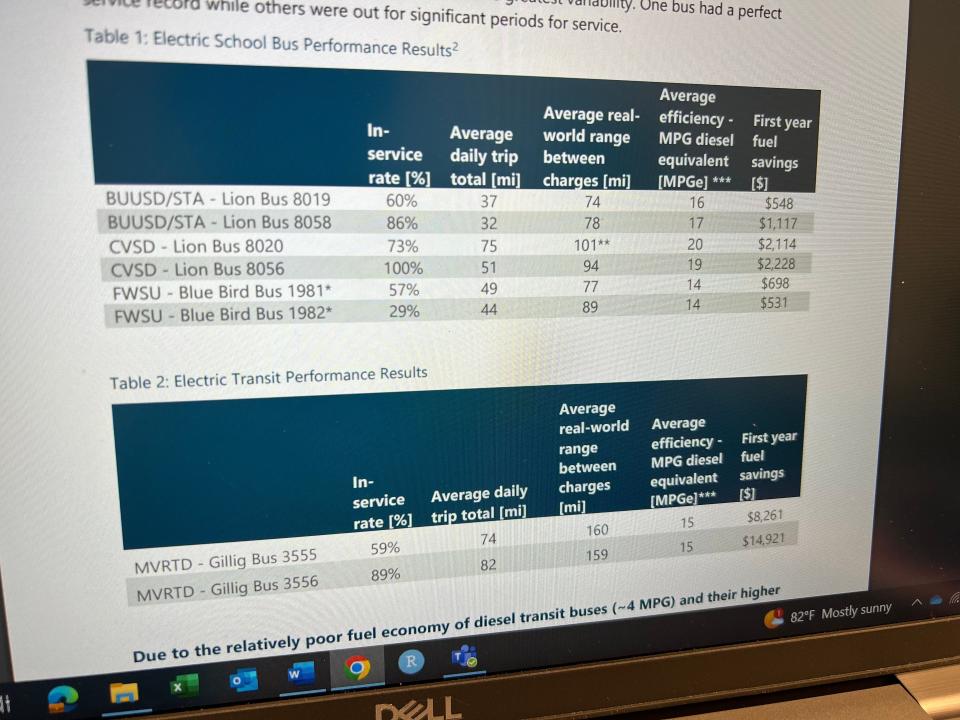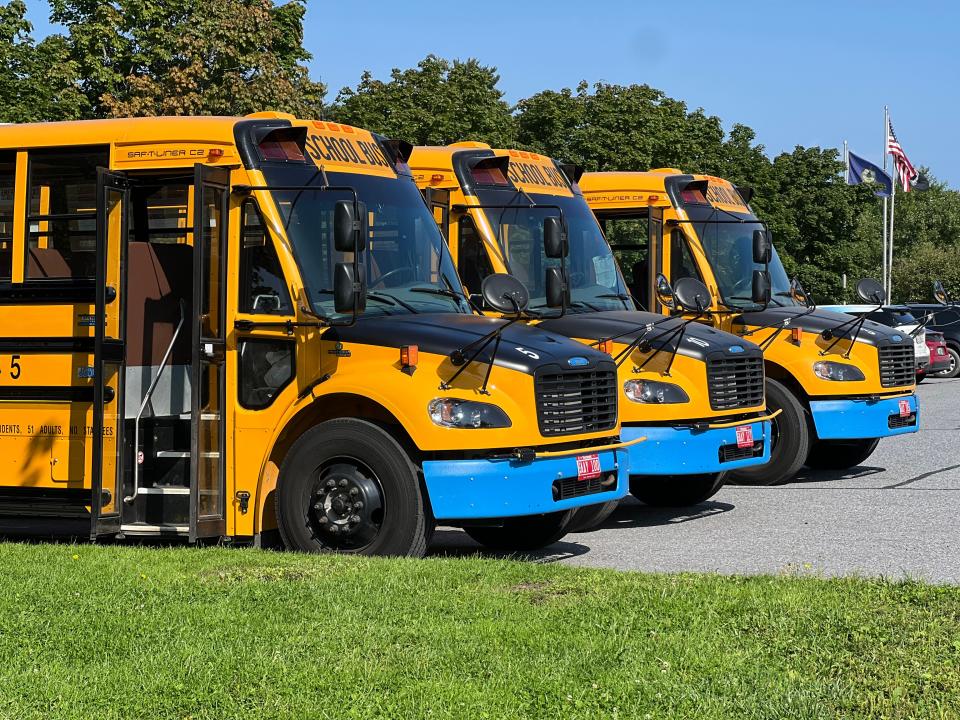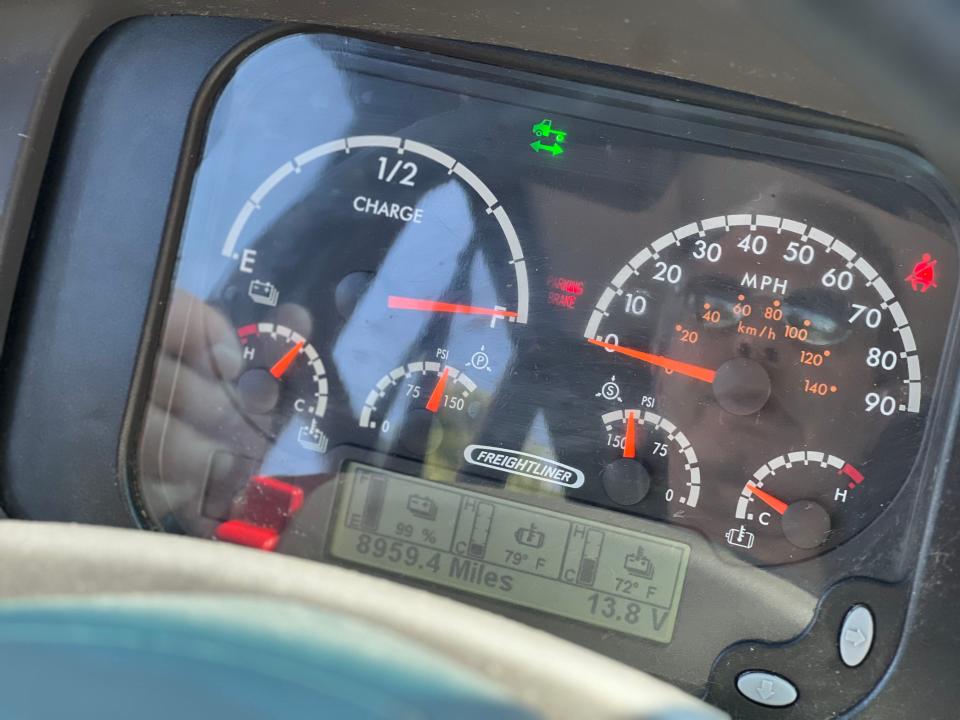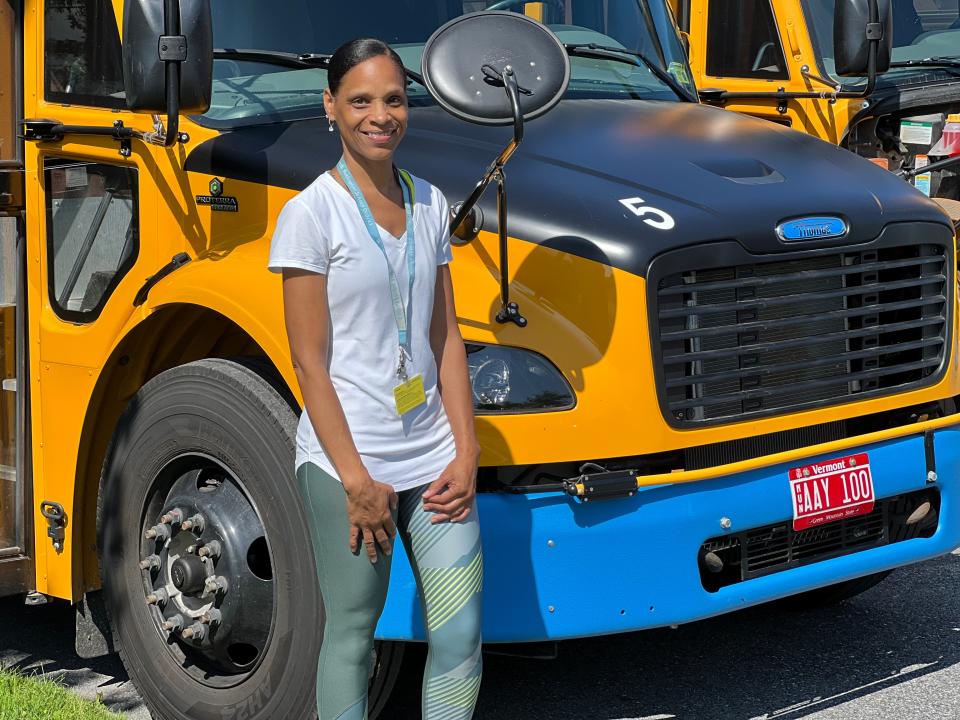Can Vermont go totally electric for school and transit buses? What one-year study showed.
SOUTH BURLINGTON - Instead of the roar of an engine, a delightful set of tones can be heard cranking up South Burlington's school bus number three. A gauge with E for empty and F for full in the familiar half-moon shape is indistinguishable from a fuel gauge apart from the word "charge." The electric blue front bumper on the otherwise yellow exterior denotes this is an electric-powered school bus.
South Burlington School District bus driver Rob Robenstein is beginning his second school year driving a battery-powered bus, one of four in the district's fleet of 28 school buses. He believes the move to clean energy in school transportation is a step in the right direction and is a viable plan in most scenarios.
"I think for doing the school bus routes it's definitely a win-win situation. It's quiet, doesn't spit out any emissions," Robenstein said.
The range could be improved and the cold weather does impact battery life, he said, but he sees it as a wave of the future.

As of September, 18 electric buses have been deployed in Vermont across four school districts and four public transit systems.
Some of those vehicles were monitored for a year as part of a pilot project involving Vermont Energy Investment Corporation (VEIC). The group studied the feasibility of electric busing including whether the batteries could go the distance and hold up to frigid Vermont winters as well as easily integrate into existing systems.
The data collected provide some answers to the greater question: how close is the technology and Vermont to casting off fuel-based transit in favor battery-powered buses?
What is working well with electric buses
The June 23 VEIC report studied eight electric buses – three different models – two each in theBarre Unified Union School District, Champlain Valley School District, Franklin West Supervisory Union School District and the Rutland-area Marble Valley Regional Transit District.
“It is feasible to operate electric school and transit buses in Vermont even in cold weather and varied terrain,” the pilot program report concluded.
Fuel savings
On average, electricity versus diesel costs saved an average of 26 cents per mile over diesel fuel costs, in the case of the Marble Valley buses which had a larger battery, $14,921 over a year. The greatest savings among school buses was $2,228 for a Champlain Valley school bus.

Maintenance savings
Engine and transmission repair tends to be costly for fuel-consuming vehicles. Champlain Valley estimated one electric bus saved $5,500 in maintenance costs over the diesel model.
Emissions reduction
In one year one school bus reduced greenhouse gas production by 11 tons and one transit bus had a reduction of 45 tons.
What challenges electric buses face
Winter battery efficiency
While buses reached their daily range goals, battery efficiency remains a concern when it comes to distance traveling, especially in cold temperatures.
For school districts, cold weather depletion didn’t affect a bus’s ability to complete its normal route. School buses traveled between 32 and 75 miles each day and were usually charged twice – once was between the morning and afternoon routes.
The two buses used in Barre lost about 1% of range every 3 degrees of drop in temperature below 75 degrees. Optimal range was 100 miles. So, at -15 degrees the battery was expected to lose 30% of range and still run for 70 miles on one charge.
The Marble Valley transit buses lost about 1% of power for every degree of temperature drop. The nominal range was anticipated to be 150 miles per charge but reached more than 200 miles on warm days. At 45 degrees, the buses were still able to run 150 miles and had more than enough charge for the 82 mile daily route at lower temperatures.

Charging
Charging was an issue at every site at some point forcing vehicles to be out of service for extended periods, the report noted. Particular attention should be paid to charger selection, placement, operation and maintenance, the document said.
Service and Maintenance
Out of the eight buses monitored, seven were out of commission at least part of the time due to service needs. The Blue Bird buses in Franklin West had the worst performance, particularly in winter, and were operational 29% and 57% of the time. Barre and Champlain Valley’s Lion model buses fared better with 60% to 100% usage. The transit buses were in service 59% and 89% of the time.
The report said it was challenging to get timely resolution to maintenance issues even among local service centers certified to work on electric vehicles.
Accommodations may make electrification easier
The report noted takeaways learned during the year and what would be necessary for widespread deployment of e-buses.
Higher up front costs
Electric buses are much more expensive than their diesel counterparts so the up-front investment often requires financial assistance through public dollars, grants or otherwise. Much of the money for the pilot program came from a Volkswagen settlement the state received.
A typical large diesel school bus costs around $115,000; the electric school buses cost, on average, $350,000. A diesel transit bus can run $500,000 where the electric version was around $840,000. Installing chargers and the chargers themselves cost school districts between $24k and $36k additional. The transit company spent about $200,000 for chargers, installation and site work for two buses.

Additional charging stations
The report found additional charging stations were useful. Other than high power chargers at the main bus lot, a low power charger at the maintenance shed proved helpful for buses out of service for extended periods or arriving with low charge. While no drivers were taking buses home in the pilot, the report noted that is common practice and it would be important to look into home infrastructure upgrades, billing arrangements and how to install an easy to remove charger if the employment relationship changes.
Diesel added for warmth
Some buses had auxiliary diesel heaters installed to reduce the drain on the battery, extend their range and reduce mechanical issues they faced in extreme temperatures.
How drivers feel about electric school buses
Overall, Robenstein, the school bus driver, enjoys driving electric bus number three on which he has put 9,000 miles so far. He said it takes a little bit of time to get used to the technology and driving it, but it isn’t difficult to pick up. The acceleration in general and going up hills is a little slower than a gas or diesel vehicle, he said, and similarly there is less need for the brakes as the bus naturally slows itself. The brakes are regenerative, though, and can put power back into the battery. There are just two gears: drive and low.
Cassandra Johnson, also a South Burlington school bus driver, was driving buses in Georgia before moving to Vermont last November and was very surprised to be put into an electric bus. She drove it for a couple months and said the big difference was the sound.

"Once I got the hang of it, it was the most joyous ride. It's like a whisper, you hardly know it's on at traffic lights and stop signs," she said. "The kids are more quieter because there's no loud engine noise."
She said the volume of the kids talking typically gets louder as the engine, gear changes and uphill acceleration noise increases. On an electric bus, she said it's a more peaceful atmosphere and the kids' volume reduces as the bus noise does because they don't want to be overheard.
Robenstein said the electric buses work for daily routes but not for other uses.
"We can't use them on long field trips or longer sporting events because it doesn't have the range," Robenstein said.
Johnson also feels the time isn't ripe yet to switch to electric only. She said it takes time to transition people away from one way of doing things. Because the buses sometimes need to be serviced, it's helpful to have a mixture of diesel and electric to get them through.
Contact reporter April Barton at abarton@freepressmedia.com or 802-660-1854. Follow her on Twitter @aprildbarton.
This article originally appeared on Burlington Free Press: Are electric buses feasible in VT? A one-year study provides answers.

